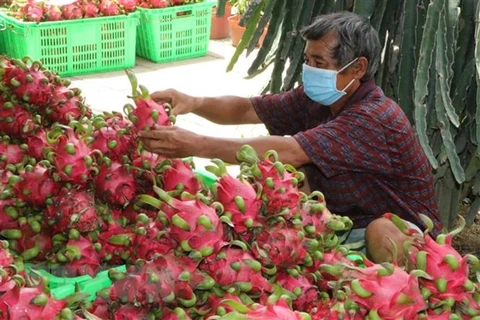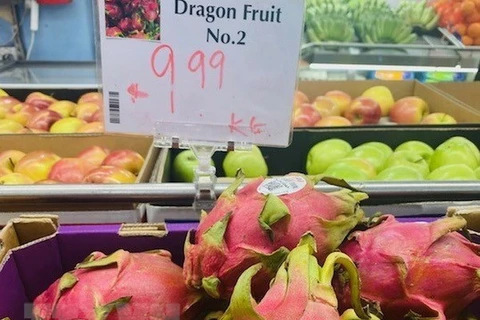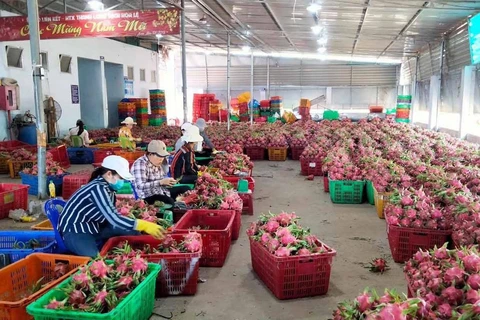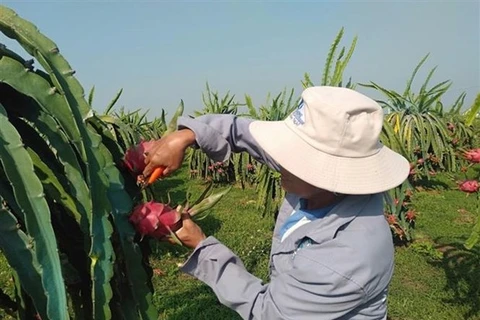Binh Thuan (VNA) – The dragon fruit of south-central Binh Thuan province was recently granted a protected geographical indication (PGI) certificate in Japan, which is said to create both opportunities and challenges.
The GI of “Thanh long Binh Thuan” (Binh Thuan dragon fruit) officially became protected in Japan on October 7 this year, making this fruit the second product of Vietnam to be given a PGI certificate in the North Asian country.
The acquisition of this certificate is an important milestone in the export of dragon fruit to Japan, as well as in the promotion of GI certification for other agricultural products of Vietnam in this demanding market, Dinh Huu Phi, Director of the Intellectual Property Office of Vietnam, told a meeting held by the Binh Thuan provincial People’s Committee on December 29.
He added it will also open up new chances for Vietnamese farm produce to enter other choosy markets like Europe, the Republic of Korea, and New Zealand.
Chairman of the Binh Thuan Dragon Fruit Association Vu Huy Hoang said products with protected GIs in Japan will secure almost absolute trust from local consumers and be sold at a much higher price than others there.
By the end of 2021, Binh Thuan has had over 33,000ha under dragon fruit cultivation with an output of more than 690,000 tonnes.
Phi noted that gaining PGI certificates is an important stride but how to maintain GIs is more important.
With a number of strict requirements in terms of production unit codes, quality, food safety, among others from Japan, the entire political system, from the provincial People’s Committee to departments, sectors, and the dragon fruit association, needs to engage in the management and development of this GI.
Each party involved in farming, processing, trading, and distribution should cooperate with one another to ensure sustainable development of the sector.
During 2016 - 2020, businesses in Binh Thuan exported nearly 32,000 tonnes of fresh dragon fruit worth 37 million USD via official channels. However, the volume accounted for only 2 - 3 percent of the total shipments, while the rest was exported via unofficial channels.
Nguyen Minh, Vice Chairman of the provincial People’s Committee, called for boosting communications to improve farmers and traders’ compliance with GI-related regulations, increasing advertisement of the Binh Thuan dragon fruit, cooperating to create a dragon fruit value chain, developing an e-commerce platform for the fruit, and forming specialised farming zones applying VietGAP standards./.
The GI of “Thanh long Binh Thuan” (Binh Thuan dragon fruit) officially became protected in Japan on October 7 this year, making this fruit the second product of Vietnam to be given a PGI certificate in the North Asian country.
The acquisition of this certificate is an important milestone in the export of dragon fruit to Japan, as well as in the promotion of GI certification for other agricultural products of Vietnam in this demanding market, Dinh Huu Phi, Director of the Intellectual Property Office of Vietnam, told a meeting held by the Binh Thuan provincial People’s Committee on December 29.
He added it will also open up new chances for Vietnamese farm produce to enter other choosy markets like Europe, the Republic of Korea, and New Zealand.
Chairman of the Binh Thuan Dragon Fruit Association Vu Huy Hoang said products with protected GIs in Japan will secure almost absolute trust from local consumers and be sold at a much higher price than others there.
By the end of 2021, Binh Thuan has had over 33,000ha under dragon fruit cultivation with an output of more than 690,000 tonnes.
Phi noted that gaining PGI certificates is an important stride but how to maintain GIs is more important.
With a number of strict requirements in terms of production unit codes, quality, food safety, among others from Japan, the entire political system, from the provincial People’s Committee to departments, sectors, and the dragon fruit association, needs to engage in the management and development of this GI.
Each party involved in farming, processing, trading, and distribution should cooperate with one another to ensure sustainable development of the sector.
During 2016 - 2020, businesses in Binh Thuan exported nearly 32,000 tonnes of fresh dragon fruit worth 37 million USD via official channels. However, the volume accounted for only 2 - 3 percent of the total shipments, while the rest was exported via unofficial channels.
Nguyen Minh, Vice Chairman of the provincial People’s Committee, called for boosting communications to improve farmers and traders’ compliance with GI-related regulations, increasing advertisement of the Binh Thuan dragon fruit, cooperating to create a dragon fruit value chain, developing an e-commerce platform for the fruit, and forming specialised farming zones applying VietGAP standards./.
VNA

























